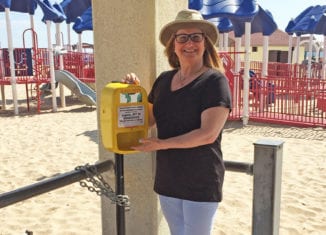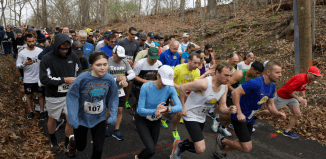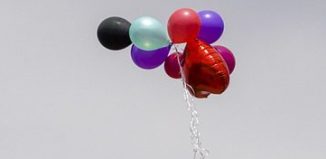Huntington official urges residents to be smart with their skin
Councilwoman uses personal experience with skin cancer as motivation to spread awareness

For one Huntington Town councilwoman, warning residents about the dangers of the sun isn’t just a work obligation — it’s personal.
Councilwoman Susan Berland (D) has been dealing with the effects of spending summers under the sun’s rays for nearly a decade, and it has motivated her to host “Melanoma Prevention: Avoiding the Dangers of Tanning,” an event open to the public Tuesday, April 25, at 7 p.m. at Town Hall, 100 Main St.
“I think it’s important for any parent whose kid wants to tan to learn spending too much time out in the sun is dangerous,” Berland said in a phone interview. “Hopefully this sways people from making bad decisions.”
Berland said she had her first run-in with skin cancer seven or eight years ago, when she discovered she had an irregular mole on her lower back that was precancerous. These moles, also known as dysplastic nevi, increase the risk of a patient developing melanoma in a mole elsewhere on the body.
“When I was in high school, I was one of the girls wearing Hawaiian Tropic [sunscreen] zero [SPF] and using tinfoil at the beach getting fried,” Berland said. “I did a lot of damage. Nobody knew, you just always thought you looked so much better with a tan.”
When she had kids, she said she was focused on making sure her children were protected with sunscreen, and would often “run out of steam,” by the time it got to her skin.
Berland, like many other people, learned of a “base tan,” a once-popular idea to get before vacations, where the thought was getting a starter level for a tan on your skin would help protect it from getting burnt when on tropical vacations. Many science and health organizations, including medical research group Mayo Clinic, have come out against base tans in recent years, saying they do not protect skin anymore than sunscreen and can actually cause more damage long term.
“I didn’t get fried anymore, and I really thought I was doing the right thing and getting a healthy tan,” Berland said. “Turns out there’s really no such thing as that.”
The councilwoman said she’s had six procedures so far — the most recent in March — to remove dangerous parts of her skin, and she goes for full-body checks every three months.
“I always hope to leave the doctor’s office as I came in but that hasn’t been the case yet,” she said. “The pain is just not worth it — it’s just not.”
In some cases she said skin abnormalities had to be removed with liquid nitrogen. “On a scale from one to 10, that’s about a seven, but in some cases I had to have the procedure on my lip and that is like a 50,” she said of the pain associated with the treatment. “And that is why I am doing this. People are not paying close enough attention. I am a total convert now, I lay under an umbrella at the beach and wear SPF 50.”
Berland said she hopes people will realize how serious skin protection is during the event, where Meghan Rothschild, a cancer survivor and spokesperson for the Melanoma Foundation of New England will be speaking about her fight against cancer and how to prevent melanoma, the deadliest form of skin cancer and the second most-common cancer in children, teens and young adults aged 15-29. New York State Attorney General Eric Schneiderman (D) will also be attending the event, and echoed the dangers of tanning.
“To many people, indoor tanning seems like a harmless activity — it’s not,” Schneiderman said. “Each session increases your risk of skin cancer and contributes to premature aging, eye damage, allergic reactions and more. There are many myths and misconceptions concerning the safety of tanning, many of them perpetrated by the indoor tanning salon industry. If you engage in indoor tanning or are thinking about it, it’s important to make sure you know the significant associated health risks.”
Berland said she would tell young children considering going to a tanning booth to get their tan out of a bottle.
“Spray tans or makeup, if you don’t like it you can wash it off and start again,” she said. “But in a booth there is nothing you can do to reverse the damage. It’s just not worth it. The pain you go through, the anxiety of wondering when the next spot will be found on your body. You’re playing Russian roulette with your body.”






